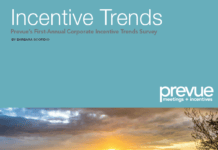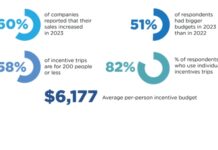What do Gen Z and Baby Boomers have in common? They — and all generations — appreciate incentive travel as a reward. However, there are some generational differences in incentive travel preferences.
Travel incentives are among the most-preferred options across all generations of incentive award winners, according to the Incentive Research Foundation’s Generational Expectations of Incentives. However, there are also differences in what each generation of incentive award winners most appreciate. For example, those in the late stages of their careers would rather go to a drivable, domestic destination instead of hopping a flight to somewhere exotic. Those in the 18-30–year–old range tend to prefer group travel incentives.
What other generational differences might there be that incentive planners need to know? Prevue asked Richelle Suver, Chief Revenue Officer at One10 Marketing, to tell us some of the insights she shared during a session on generational differences in incentives at SITE Global Conference in Istanbul, held Feb. 26-29.

Prevue: How have recent disruptions affected different generations when it comes to incentive travel?
Suver: Overall, the industry is rejoicing in seeing incentive group travel bounce back up to pre-pandemic levels. We expect this trend to continue and the interest in incentive group travel to continue to climb.
However, there are a few elements of group travel that are changing, and it’s a welcome change across the generations. No longer are we structuring events for participants from morning to evening. Instead, participants value leisure time and more opportunities to choose their own activities to enjoy while on the trip.
Generationally speaking (early career) haven’t yet had the opportunity to win an incentive in many cases, however, studies show once someone has earned an incentive trip, it rates high on the reward type they most prefer.
Prevue: What are some of the key differentiators when it comes to incentives for the generations we currently have in the workforce?
Suver: Baby Boomers (1947-1964) are focused on retirement. They value relationships and like public recognition. They enjoy social elements and camaraderie of group travel and group dining experiences.
Gen X (1965-1980) are independent and autonomous, flexible and tech savvy. They like informal recognition. Similar to Baby Boomers, they like group travel/dining experiences.
Millennials (1981-1996) are creative and innovative. They want instant gratification, a fun/engaging work environment and immediate/frequent praise.
Gen Z (1997-2012) are entrepreneurial, tech savvy and environmentally conscious. They expect regular, instantaneous recognition and want to emphasize mental health. Gen Z enjoys travel, but they may be in the early stages of their career and haven’t had the opportunities to earn this group travel quite yet.
Overall, all generations prefer travel rewards.
Prevue: What would you say are the most important things to keep in mind for those who are planning incentives for a multigenerational workforce?
Suver: In today’s world we expect personalization —Netflix, Amazon Alexa and others have trained us to expect our suppliers to know our likes and dislikes. Part of the ROE (return on experience) is the bragging rights of having had a memorable, one-of-a-kind experience.
No matter what the participant’s age, the key differentiator to a successful incentive group travel program is crafting a unique travel experience that they couldn’t do on their own.
You May Also Be Interested In…
Prevue Releases First-Annual Incentive Trends Survey
Generational Preferences: Travel Incentive Rank High with All Ages











